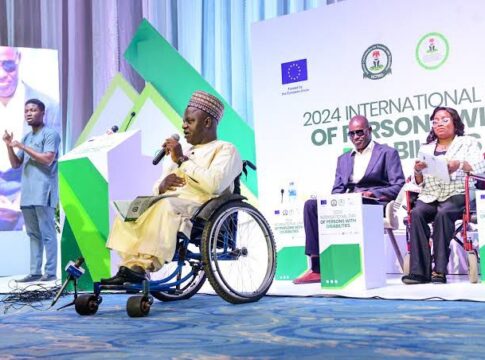The European Union (EU) has called on Nigeria’s government to prioritize the full implementation of the National Disability Act, emphasizing its critical role in creating an inclusive society.
With over 35 million Nigerians living with disabilities, 90% of whom are below the poverty line, effective enforcement of the law is seen as a lifeline for millions.
The EU made the appeal during a national dialogue in Abuja to mark the International Day of Persons with Disabilities. Themed *“Transformative Solutions to Disability-Inclusive Development in Nigeria,”* the event was organized by the National Commission for Persons with Disabilities (NCPWD) and the Ministry of Humanitarian Affairs and Poverty Alleviation, with EU backing through its Rule of Law and Anti-Corruption Programme.
“People with disabilities are being left behind in development planning,” said Ruben Alba Aguilera, Head of Governance, Security, and Migration at the EU Delegation to Nigeria. “They face barriers that lead to poverty, poor health, and limited access to education and jobs. This is unacceptable. We must act deliberately to foster inclusion.”
READ MORE: Northern Governors Oppose Tax Reforms, Cite Unfair Benefit to Lagos and Rivers – Zulum
*Urgent Call for Action*
Aguilera commended Nigeria for enacting the Disability Rights Law and establishing the NCPWD but urged swift action. “A law is only as strong as its implementation. Now is the time to dedicate sufficient resources and ensure the law has real impact,” he added.
Prof. Nentawe Yilwatda, Minister of Humanitarian Affairs and Poverty Reduction, represented by Director Sunday Hezekiah, acknowledged funding gaps for disability-related programs. “While the Act mandates education, welfare, and other rights, allocations by the National Assembly remain inadequate,” he noted.
Ayuba Gufwan, Executive Secretary of the NCPWD, urged stakeholders to reflect on progress and accountability. “Today is for stocktaking—where are we coming from, where are we now, and where are we heading?” he said.
EU’s Commitment to Inclusion
The EU reaffirmed its commitment to disability-inclusive development. Aguilera highlighted that societal barriers, not disabilities, often exacerbate inequality. “Disability inclusion must be embedded in our planning and programming if we are serious about sustainable development,” said Danladi Plang, Head of the EU’s RoLAC Programme.
Abba Isa, Senior Special Assistant to the President on Special Needs, called for collaboration. “Awareness is key. Ignorance of the law is no excuse; we must act now,” he urged.
Impact on the Ground
For many Nigerians with disabilities, the stakes are high. “Over 35 million of us face challenges daily,” Aguilera stated, underscoring the need for an inclusive society that values diversity and ensures equity.
The EU pledged to continue working with Nigeria to ensure that persons with disabilities are not left behind in the nation’s development agenda.




